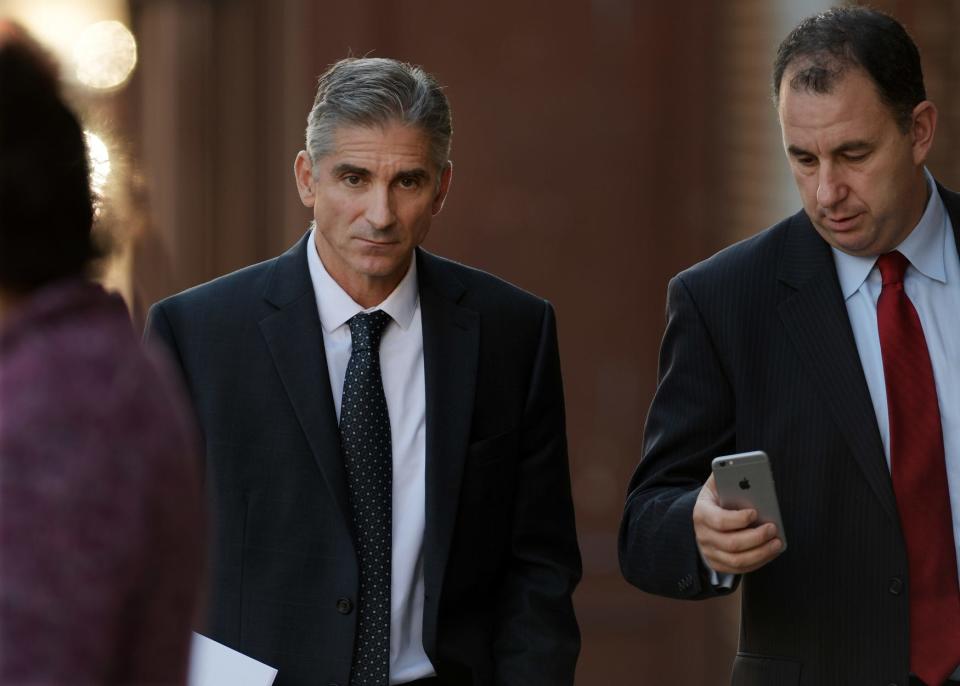TD Bank agrees to pay $95 million to victims of TelexFree Ponzi scheme
BOSTON - A judge in Boston this week approved the largest settlement yet in the multistate federal lawsuit related to the Marlborough-based TelexFree Ponzi scheme: a $95 million agreement from TD Bank.
“This is a good recovery for the people,” Robert J. Bonsignore of Medford, a lead attorney on the case, told the Telegram & Gazette when reached by phone Friday night.
Court records show U.S. District Court Judge Nathaniel M. Gorton gave final approval to the settlement after a hearing in Boston on Tuesday.
The settlement is the second significant payout reached in the decade-old civil lawsuit regarding the sprawling, multibillion-dollar Ponzi scheme. The first was a $22.5 million settlement with Leominster-based Fidelity Bank and its former president in 2021.
Bonsignore said total settlements in the case are now up to about $125 million. Wells Fargo Bank and Propay Inc., a payment processing company, are the largest remaining defendants, court records show.
“We’re just going to keep going until we make the victims whole,” said Bonsignore, who described the case as the hardest he’s lawyered.
Bonsignore and the many other plaintiffs’ lawyers were approved for $27.5 million in lawyers’ fees and about $1 million in costs arising from the settlement in December by U.S. District Court Judge Timothy S. Hillman in Worcester, court records show.
TD Bank was initially dismissed from the TelexFree lawsuit, but Hillman reinstated the New Jersey-based bank – along with Bank of America and PricewaterhouseCoopers – in 2021 after Bonsignore and other lawyers argued new evidence justified doing so.
Bank of America and PricewaterhouseCoopers were later dismissed again from the litigation; Bonsignore wrote in court papers that he believes Bank of America will eventually be reinstated upon appeal.
TelexFree was a Marlborough-based company that disguised itself as an internet phone service provider but was in reality a large pyramid scheme.
The company, prosecutors have said, relied almost entirely on new infusions of cash from “promoters” — people who paid for the right to promote the voice-over internet services TelexFree provided — to stay afloat.
The promoters didn’t actually sell the product — only hyped it — and the scheme grew into an international operation federal prosecutors have said impacted more victims than any other Ponzi scheme they've encountered.
Plaintiffs in the federal lawsuit have alleged that large financial institutions bear part of the blame for allowing the operations of TelexFree to succeed, even after it was ordered shut down in Brazil in 2013.
TD Bank was in 2021 accused of letting TelexFree open new accounts, despite knowledge of the 2013 shutdown, and of helping it make “large fund transfers between accounts to assist (in) obscuring the source and movement of its funds.
“In one instance, TD Bank facilitated the transfer of three million dollars between three accounts within the span of seven minutes,” the plaintiffs alleged in 2021.
While a class has not yet been certified in the litigation, lawyers have said it could include as many as 700,000 people worldwide. The U.S. Department of Justice has said the case had “over a million victims worldwide and losses of $3 billion.”
The co-founders of TelexFree, Carlos Wanzeler and James Merrill, were indicted federally in July 2014 on charges that they operated TelexFree as a massive pyramid scheme.

Merrill pleaded guilty to those charges and was sentenced in March 2017 to six years in prison. Wanzeler remains a fugitive; the last entry on his federal court docket was in 2020.
Bonsignore wrote in court documents regarding the TD Bank settlement that the current civil case “represents the last best hope for a significant recovery for the class."
Authorities in summer 2020 announced that $150 million in payments would be distributed to more than 100,000 victims from a separate action in U.S. Bankruptcy Court.
“The DOJ prosecutions and the related bankruptcy proceedings have largely run their course without recovering more than pennies on the dollar,” Bonsignore wrote.
According to Bonsignore's filing, lawyers were able to send emails to 580,295 potential class members after preliminary approval of the TD Bank settlement in October, and received no objections.
Bonsignore noted the settlement is four times that of Fidelity’s, and “more than twice the amount of the TelexFree-related transactions (TD Bank) processed.”
Bonsignore told the T&G it’s not possible to say how much the TD Bank settlement could mean for the average class member since the final number of class members won’t be settled until the end of the litigation.
Money won’t be paid out until after other claims are pursued against other defendants, according to a website set up to assist potential class members, telexfreesettlement.com/Home/Notice.
Bonsignore told the T&G he and other lawyers have so far put more hours into the case than money they’ve been awarded.
“We will not stop until there’s no one (no defendants) left,” he said of the lawsuit, which was consolidated to Worcester from federal courts nationwide. “We’re committed to doing the job.”
This article originally appeared on Telegram & Gazette: TD Bank agrees to pay $95 million to victims of TelexFree Ponzi scheme

